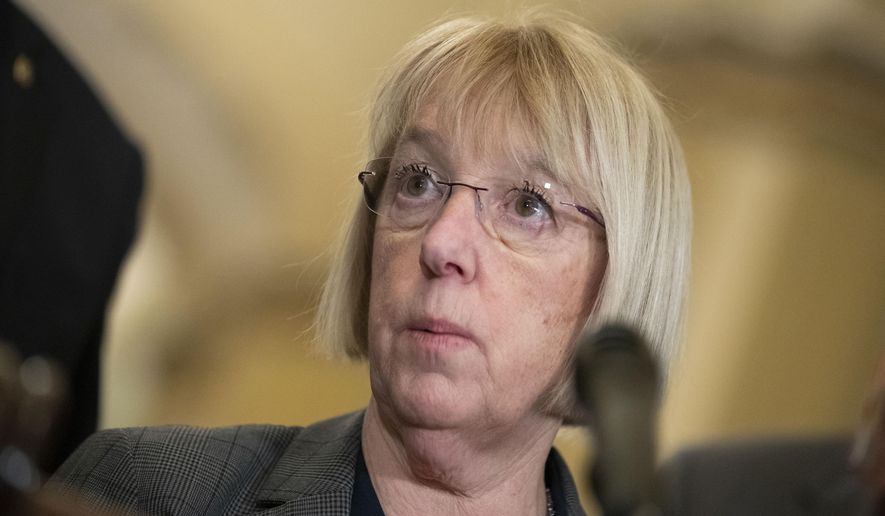The chairwoman of a Senate committee on labor and a coalition of left-of-center businesses pushed Thursday for providing all workers with 12 weeks of paid government-funded family leave, as part of the Democrats’ $3.5 trillion “human infrastructure” plan.
Sen. Patty Murray, Washington Democrat and chair of the Senate Committee on Health, Education, Labor and Pensions, portrayed the proposal as one of fairness, noting that many women quit their jobs during the pandemic to care for family members.
“Workers in this country had been forced to make an impossible choice, like going back to work days after having a child or bypassing a paycheck to care for a family member who is seriously ill,” Mrs. Murray said in a call organized by the Main Street Alliance.
The proposal is a key feature of the administration’s $3.5 trillion package that Democrats plan to take up as soon as the Senate completes action on a more traditional infrastructure spending bill.
Under President Biden’s plan, the government would spend $225 billion to pay workers two-thirds of their regular pay while taking time off to care for a newborn or adopted baby, deal with a serious illness or care for sick family members.
Workers also could get paid time off to deal with being a victim of domestic violence or sexual assault, or the loss of a loved one. The new government program would pay up to $4,000 a month.
Republicans object to the cost and say it would be more efficient to encourage companies to allow their workers to take time off.
“As a father, a grandfather and a son, I understand the need to balance family life with the workplace,” said Sen. Richard Burr, the top Republican on the committee, during a hearing on the proposal in May. “I support, and I believe most people support, being able to take time off of work when they’re sick, when their family members are sick, or after the birth or adoption of a child.”
But quoting a friend, former Republican House Speaker John Boehner, Mr. Burr said, “Everybody wants to be Santa Claus.”
Despite the GOP’s concerns, congressional Democrats are planning to push the $3.5 trillion proposal, packed full of liberal proposals like paid family leave, through Congress.
Democrats working with Republicans are expected to pass a $1.2 trillion bipartisan package as soon as Saturday to fund projects such as roads and bridges, and to expand the availability of broadband.
But Democrats will then quickly pivot to putting together their larger, strictly partisan proposal. If all 50 Senate Democrats agree on a package, they will shove the measure through Congress using a budget procedure called reconciliation.
Pushed to the sidelines, Republicans are bristling at the price tag and say the tax increases needed to pay for it will increase inflation.
“In just a few days, our colleagues will start ramming through yet another reckless taxing and spending spree. Trillions more in inflationary spending when families just want good jobs and stable prices,” Senate Minority Leader Mitch McConnell said on the Senate floor on Thursday.
Mr. Burr at the May hearing said that instead of creating an expensive new federal program, Congress should instead find ways to encourage more companies to provide a way for employees to take time off.
Elizabeth Milito, senior executive counsel for the National Federation of Independent Businesses, said at the May hearing that the federal mandate to let workers take time off would come at a difficult time.
“Many small businesses are still struggling to survive as economic conditions and business restrictions remain serious since the national emergency declaration concerning the COVID-19 outbreak,” she said. “Small businesses, which are the backbone of our economy, are especially vulnerable to the impact of labor mandates. Only about 12% of small businesses have a human resources professional or dedicated employee who handles personnel matters.”
She said a better solution “is to reduce regulations and lower taxes so that employers can weather storms and adopt flexible policies.”
Mrs. Murray said the federal program would benefit small businesses because they would be better able to compete for workers with large companies, which can more easily afford to provide time off.
Proponents of paid leave cite Labor Department data that, as of March 2020, one-fourth of workers at private companies did not have paid sick days. The number was higher, seven out of ten, for low-wage workers.
“For a typical worker without paid sick days, just two to three days away from work jeopardizes their ability to buy groceries for a month, buy gas, or pay utilities, and seven-and-a-half days risks their ability to pay a month’s rent or mortgage,” Vicki Shabo, a senior fellow at the left-of-center Washington think tank New America, said at the hearing. “Workers and families without paid sick days are also disproportionately Black and Latinx workers, for whom multiple sources of structural racism and economic inequality are associated with health disparities that layer on top of lack of access to paid sick time.”
• Kery Murakami can be reached at kmurakami@washingtontimes.com.




Please read our comment policy before commenting.